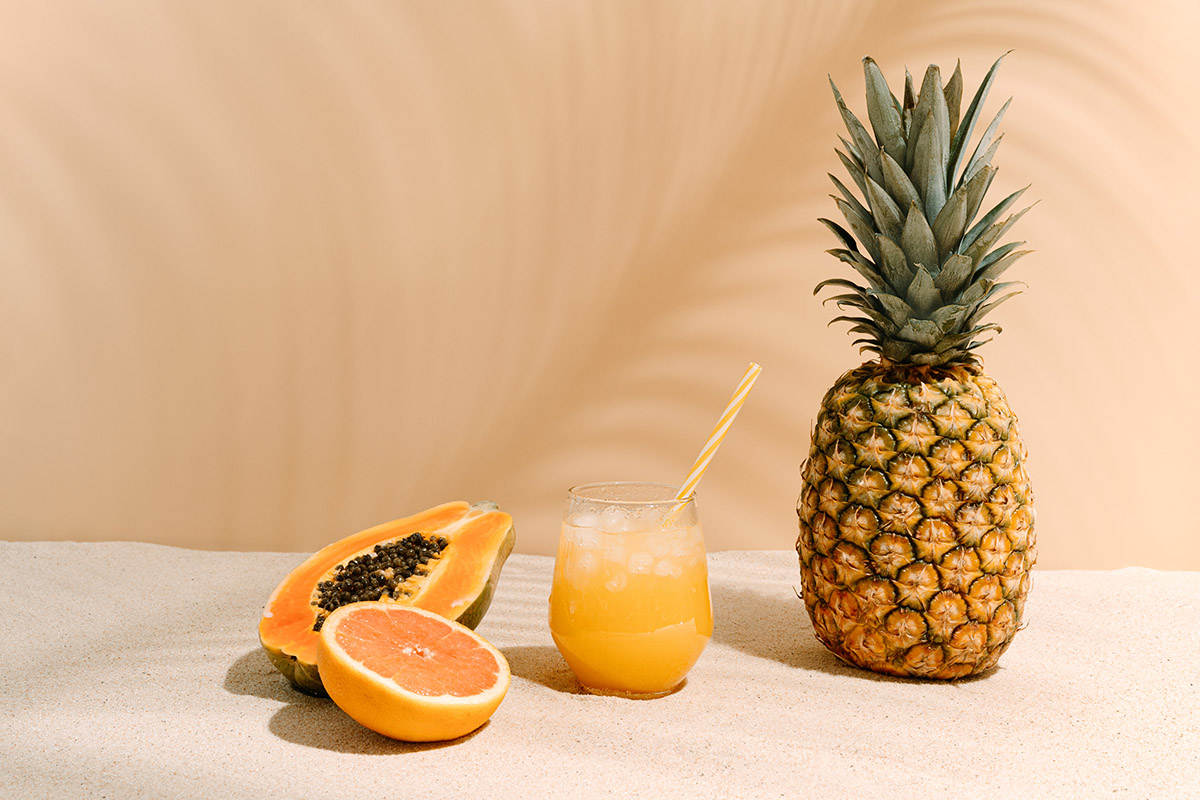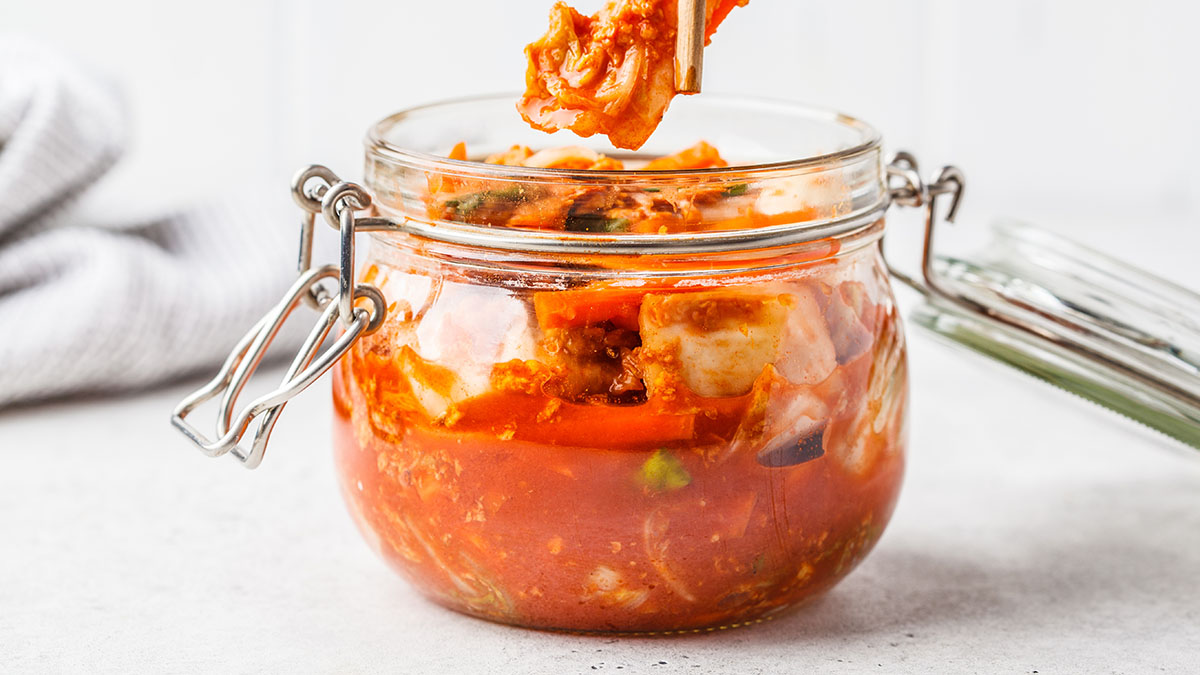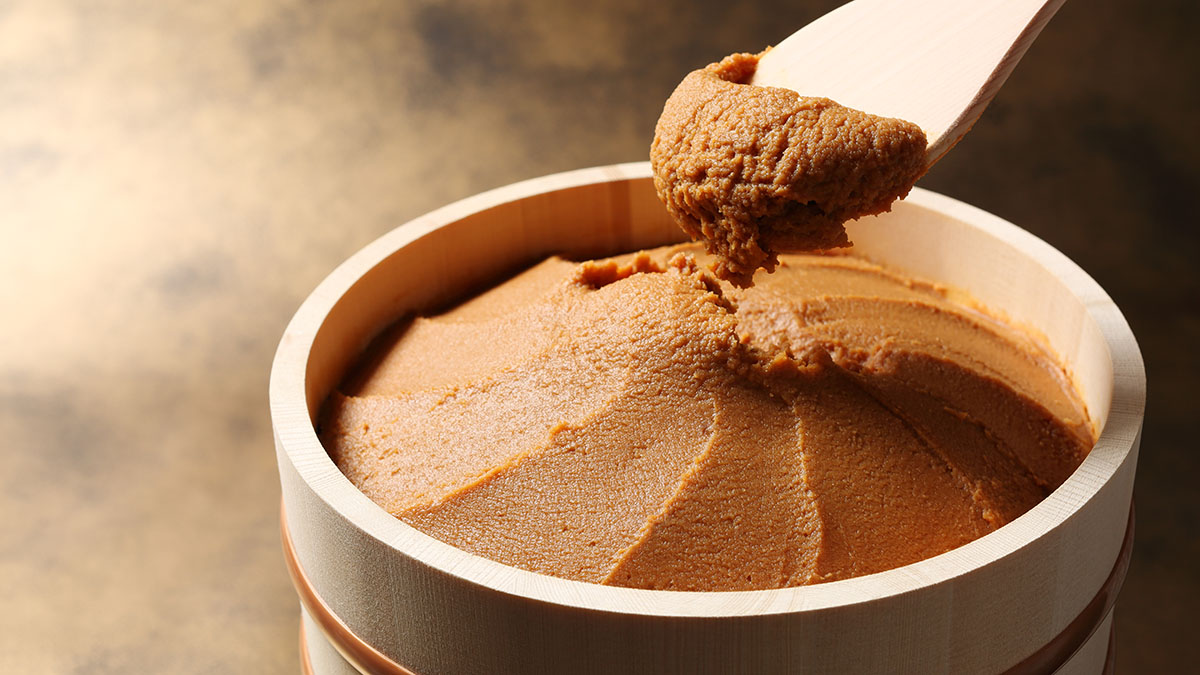Which Foods Should I Eat (and Avoid) for a Healthy Microbiome?

You’d have to have been living under a rather large rock to have missed the memo about gut health: the rise of consciously taking steps to improve the balance of the good and bad bacteria in your digestive tract.
Known as the microbiome, recent groundbreaking research has revealed that the trillions of microbes in our gut do so much more than just digest our food. They play a crucial role in regulating moods, reducing chronic inflammation, and even preventing skin issues like acne and rosacea. Plus, up to 80% of the immune system is housed in the gut, so making moves to bolster it can help to ward off seasonal sickness and flu.
Just as no two people have identical DNA, our gut microbiomes are entirely unique. Factors like diet, alcohol consumption, stress and insufficient sleep all influence the environment in your gut. Confirming this long-standing theory, the world’s largest nutritional study on gut health found that identical twins share only about 34% of their gut microbes, while unrelated individuals share around 30%.
The reassuring news in all of this is that everyone can take steps to improve their gut health, and diet is one of the most effective places to start. With that in mind, here’s our guide to the best foods for strategically building a healthy gut, along with those you should limit or avoid.
Set a weekly limit for alcohol
Aside from leaving you with a painful hangover the next day, regularly drinking too much alcohol can disrupt the delicate balance of bacteria in the gut, a process scientifically known as dysbiosis.
Biologically, excessive alcohol consumption can inhibit the production of digestive enzymes and juices, making it more challenging for your body to digest and absorb essential nutrients from food.
A small study examined the gut flora of 41 alcoholics compared to 10 healthy participants who consumed little to no alcohol. The researchers found that dysbiosis was present in over a quarter (27%) of the alcoholic group, while the healthy individuals showed no trace of this imbalance.
Limiting alcohol can be challenging at first, but taking small, progressive steps to reduce your intake can be highly beneficial in the long run. Pouring smaller servings, committing to alcohol-free days each week, and choosing low or no-alcohol options are all smart strategies to help curb your consumption.

Top your avocado on toast with kimchi
Who doesn’t love starting the day with a creamy pile of avocado on a warm slice of sourdough? If you’re in the habit of making breakfast in the morning, an easy addition for gut health is to top your savoury dish with a serving of kimchi.
Although the research is limited, small studies on this spicy Korean cabbage dish have found that it may reduce markers of stomach inflammation in people with the common stomach parasite H. pylori. In another 2019 study, people with a history of digestive problems reported less pain, heartburn, bloating and gas after eating 75 grams of kimchi twice a day for two weeks.
You can usually find kimchi sitting in the refrigerated section of your local health food store, but if you’re feeling adventurous, you could even try your hand at making it yourself. Experimenting with a homemade jar not only adds a fresh challenge to your culinary skills but it also lets you tailor the flavours to your palate preferences.
Switch out fizzy drinks for kombucha
When the 3pm weekday slump hits, it’s tempting to reach for a cold, fizzy drink to help you power through. But a 2014 study published in the journal Nutrition revealed that middle-aged people who regularly consume sugar-sweetened fizzy drinks tend to have 30% more visceral fat in their abdomen on average. This type of hard-to-budge fat is linked to an increased risk of heart disease.
If your afternoon sugar fix has become a sacred ritual, there’s an easy switch you can make: stock your fridge with bottles of kombucha. This tart, fizzy tea is made by adding a symbiotic colony of bacteria and yeast, along with sugar, to green or black tea.
During fermentation, alcohol and gases are produced, alongside live bacteria that can help balance levels of bacteria in the gut and enhance digestion. For convenient grab-and-go options, check out bottled kombucha brands including Momo and LA Brewery.
Add digestive enzymes into the mix
Digestive enzymes are really important for our day-to-day gut function. They’re responsible for breaking down the food you eat into its smallest components, making it easier for your body to absorb all the nutrients. Without them, your gut might struggle to process certain foods, leading to discomfort and bloating.
While our bodies naturally produce digestive enzymes, factors like age, diet and digestive disorders can all affect their production. Thankfully, we can also get our fix from enzyme-rich foods like pineapple, papaya, and fermented foods as well as supplements. If you’re keen to up your intake, all of Form’s protein powders contain the enzymes Amylase, Protease, Lactase, Lipase and Cellulase to aid and boost your natural digestion.

Coat your tofu in miso
A small but fascinating study from Japan found that people who regularly add miso into their diet have lower incidences of stomach cancer and heart disease. Plus, further research has found that this mighty fermented paste may have an anti-inflammatory effect throughout the body, helping to lower our risk of a laundry list of diseases.
Both salty and savoury, this Miso is a classic staple of Japanese cooking that has a rich umami flavour. It’s made by combining just three ingredients – soybeans, salt, and koji (a fungus extracted from rice) – and allowing the mixture to age for several months at a time.
Thanks to the growing popularity of Japanese cuisine, you can now buy miso paste from most major supermarkets, although Asian or Japanese specialty stores will have a larger selection on offer. Add it directly to soups to enhance the flavour profile, or whisk it with rice vinegar, soy sauce and mirin to create delicious stir fry sauce.
Reduce your reliance on artificial sweeteners
Found lurking in soft drinks, snack foods and sugar-free sweets, artificial sweeteners are everywhere – even in many foods that you wouldn’t expect
A recent study conducted by Anglia Ruskin University (ARU) and published in the journal Frontiers in Nutrition uncovered that one popular artificial sweetener called neotame can cause previously healthy gut bacteria to disease and invade the gut wall.
The study authors concluded that there’s a growing awareness of the health impacts of sweeteners such as saccharin, sucralose and aspartame, with several studies demonstrating the problems they can cause to the wall of the intestine and the damage to the ‘good bacteria’ which form in our gut.
As well as flipping over your food products and checking out the ingredient list in the supermarket, swapping out sugary cereals, substituting sweets for trail mix and going cold turkey on diet drinks can help you to cut back on your intake.
The good news? Many people anecdotally report that following a diet with less artificial sweetener gets easier over time, as studies have found that your taste buds become more sensitive to sweet flavours, the less you eat. Essentially, with determination and perseverance, that afternoon bowl of fresh berries may soon satisfy your sweet tooth as much as a cold can of cola.


















